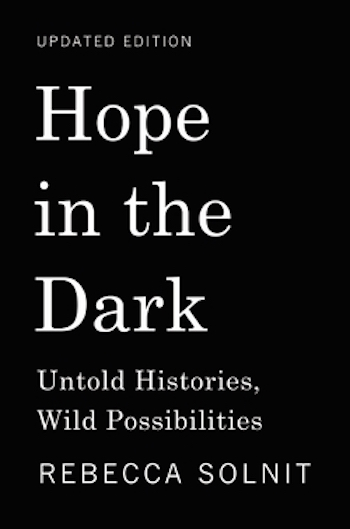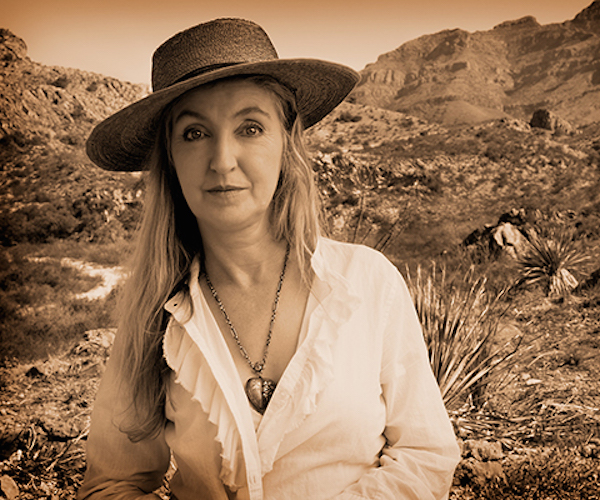Book Review: “Hope in the Dark” — An Homage to Community
Now, more than ever, it’s worth being reminded of our natural potential for good.
Hope in the Dark by Rebecca Solnit. Third Edition, 2016, Haymarket Books, 184 pages, $15.99.
By Monica Hileman

I was once arrested in the Boston Federal Building in a non-violent protester against US military aid to El Salvador. There were too many of us to lock up, so they kept us overnight in the basement. I’d marched for women’s rights, protested apartheid, walked picket lines, and volunteered on Central American solidarity committees, but that act of civil disobedience over three decades ago was the only time I was brought up on charges (dropped the next morning at the mass arraignment). I never felt like an activist and certainly the past two decades, I’ve hardly been involved with any causes. My days of reading political theory long over and not one inclined to self-help, I wouldn’t have picked up Hope in the Dark (“hope,” that vague, overused word tinged with a mushy, motivational hue) if I hadn’t heard Rebecca Solnit talking about how it’s better to have hope than not in an interview on NPR the week before the recent inauguration. She sounded well-grounded and insightful; I was curious about this book she’d written back in the time of the Iraq war that had recently been reissued. Then, as now, people were upset with a reckless president (Bush) who didn’t represent them. Activism became, as she says, her beat.
A contributing editor to Harpers and author of several books, Solnit immersed herself in grassroots movements to better understand the large and small ways that people taking organized public action have on the world we live in. Her essays, often a mix of memoir and social commentary, shift back and forth from a wide scope to a tight focus on telling particulars. (Similar to how an essay on TomDispatch moves from a retirement board hearing considering divestment in fossil fuels to the story of a man who lived to tell how he survived 9/11 by taking the stairs.)
The future is uncertain and in that unpredictability are all kinds of possibilities. Often change comes slowly. Impatient for results, we’re apt to be unaware of the dormant influence or shifts in attitude that lay the groundwork for dramatic change that comes later. To throw up one’s hands and say we’re doomed is indulgent and has the same effect as the witless person who says, “Everything’s fine.” Solnit quotes Paria Popova, “Critical thinking without hope is cynicism. Hope without critical thinking is naiveté.” Things are bad, but things are not all bad. She reminds us of Nelson Mandela, of the progress in racial equality, acceptance of LGBT and women’s rights, and the rise of movements like Occupy Wall Street and Black Lives Matter.
Solnit mentions the recent paradigm-shifting work of researchers and scholar who maintain that cooperation—not competition—is what allowed early humans to develop. (Here it would have been nice to have some footnotes.) She takes on the notion of civilization as a thin veneer that quickly erodes under the pressure of a natural disaster or bombing raids; contrary to the prevailing notion that our true nature is violent, selfish, and chaotic, she argues that “in most disasters people are calm, resourceful altruistic, and creative.” (A conclusion she reached writing a previous book, A Paradise Built in Hell, that looks at historic earthquakes, the London Blitz, Hurricane Katrina, and other horrific events.)

Rebecca Solnit — she point out that things are bad, but things are not all bad.
Solnit points to the end of the USSR, the tearing down of the Berlin Wall, the Arab Spring, and Latin American countries no longer under repressive regimes as examples of the transformations brought about by popular power. True, the brutal Latin American dictatorships do seem to be a thing of the past, but for every Michelle Bachelet in Chile, there is a Viktor Orban in Hungary. Stalin is long gone but now we have Putin.
Our better selves are not well represented in the media. Popular culture features bad guys (more interesting than heroes). It’s worth being reminded of our natural potential for good. I think of the man I saw a few months ago having to answer a question from a TV reporter about why he rushed into a burning house to save whoever was inside. He looked a little perplexed because, as he said, he didn’t think about it and now that he was thinking about it, well, it was just what he did, acting on instinct.
Progress is fitful, maybe elusive. What we have is a mixed bag; who knows what we can pull out of it? Camus laid out the choice pretty well when he observed that “he who despairs of the human condition is a coward, but he who has hope for it is a fool.” More fun to be a fool and better company.
Originally from the Midwest, Monica Hileman lives just north of Boston. Her stories have appeared in journals such as Arts & Letters, The Baffler, and the Chicago Tribune’s Printers Row Journal. A story published by Flyway was nominated for The Best of the Net. Her website is monicahileman.com
Tagged: Haymarket Books, Hope in the Dark, Monica Hileman
